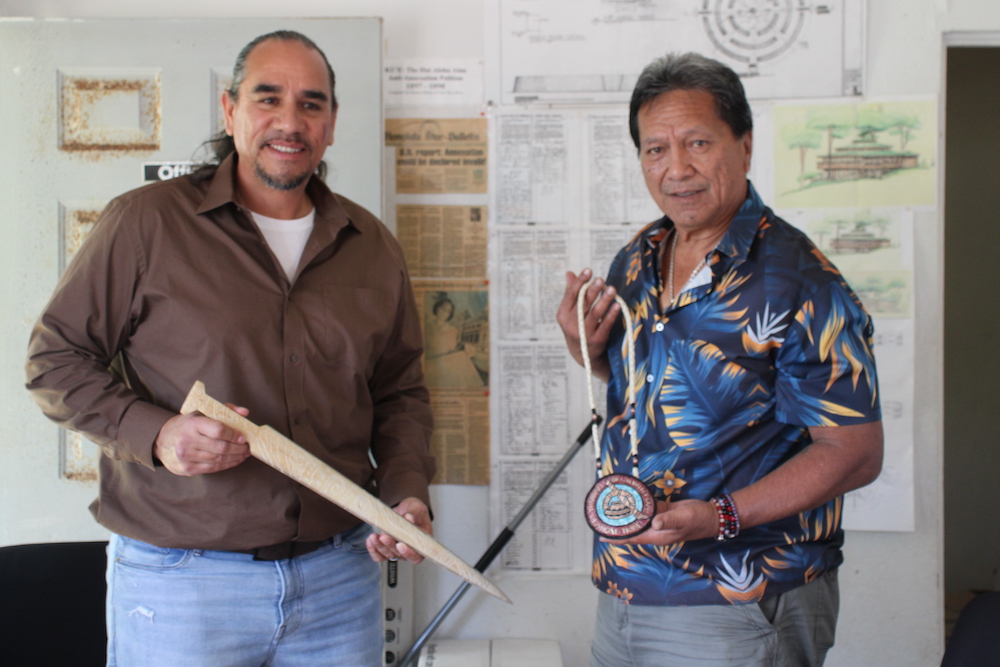
- Details
- By Darren Thompson
WAIMANALO, Hawai’i—The Independent & Sovereign Nation of Hawai’i and a California tribe have signed a first-of-its kind treaty of peace and perpetual friendship.
At a special ceremony last Friday, leaders of the Nation of Hawai’i and the federally recognized Death Valley Timbisha Shoshone Band of California, known as the Timbisha Shoshone Tribe, signed the agreement between the two nations. It is the first such treaty between the Nation of Hawai’i and a federally recognized tribe.
The treaty marks the beginning of a promising relationship between the two nations and reaffirms their commitment to Aloha, peace, mutual respect, and understanding in fostering a just and prosperous world, according to a Nation of Hawai’i press release. The treaty also establishes a framework for ongoing economic development and trade, cultural exchange and environmental protections.
“We are honored to be able to formalize our friendship with the Timbisha Shoshone Tribe in this way,” Pu‘uhonua D.B.K Kanahele, president of the Nation of Hawai’i, said. “This treaty is a tribute to the strong bond that exists between our nations, and we look forward to continuing to build on this relationship in the years to come.”
The arrangement between the two nations was facilitated by Bennae Calac, an enrolled member of the Pauma Band of Luiseno Indians and president of Onoo Poo Strategies, LLC in California. The idea was pitched to Calac by Timbisha Shoshone Tribal Chairman Jimmy-John Thompson during a training session in Honolulu. Pu‘uhonua D.B.K Kanahele, the President of the Nation of Hawai’i, is Calac’s relative and delegates from the Nation of Hawai’i were glad to meet with another Tribal Nation when asked.
“These are things that Indigenous people should be doing on our own,” Nation of Hawai’i Vice President Brandon Maka’awa’awa said during the treaty signing ceremony on Friday. “This is sovereignty.”
After the signing between nations, President Kanahele and Chairman Thompson exchanged gifts, hugs, and pledges to support each other’s communities and people.
“This treaty is a significant step forward in our ongoing efforts to promote peace and understanding among all nations,” Thompson said. “We are pleased to be able to count the Nation of Hawai’i as a close friend and ally, and we look forward to working together to build a better future for all of our peoples.”
The treaty between the sovereign nations is the first between the Nation of Hawai’i and a federally recognized tribe, but it is not the first treaty for the sovereign island nation. Today, the Nation of Hawai'i has ambassadors and representatives working in Malaysia, India, the United Arab Emirates, Nepal, Cambodia, Singapore, Thailand, Laos, Indonesia, and Zanzibar.
"Representatives are working in these nations to help build stronger relationships including signing peace and perpetual friendship treaties like the one we signed with the Timbisha Shoshone Tribe," Maka'awa'awa told Native News Online.
“The Hawai’ian kingdom had treaties with more than 30 countries—treaties of peace, friendship, commerce, navigation,” President Kanahele told Native News Online. The treaties followed the passage of Public Law 103-150—known commonly as the Apology Resolution—in 1993 on the 100th anniversary of the illegal overthrow of the Kingdom of Hawaii on January 17,1893.
The law acknowledged the historical significance of the event, which resulted in the suppression of the inherent sovereignty of the Native Hawaiian people.
The treaty will be ratified by the leadership of both nations in the coming weeks.
More Stories Like This
50 Years of Self-Determination: How a Landmark Act Empowered Tribal Sovereignty and Transformed Federal-Tribal RelationsPrairie Band Potawatomi Nation Fires Executives After ICE-Related Contract Sparks Outcry
Tlingit Haida Tribal Business Corporation Clarifies Federal Contracting Work
Homeland Tour Offers Deeper Understanding, Appreciation of Chickasaw Roots
Klamath Tribes Seek to Reverse Judge’s Removal in Water Rights Case
Help us defend tribal sovereignty.
At Native News Online, our mission is rooted in telling the stories that strengthen sovereignty and uplift Indigenous voices — not just at year’s end, but every single day.
Because of your generosity last year, we were able to keep our reporters on the ground in tribal communities, at national gatherings and in the halls of Congress — covering the issues that matter most to Indian Country: sovereignty, culture, education, health and economic opportunity.
That support sustained us through a tough year in 2025. Now, as we look to the year ahead, we need your help right now to ensure warrior journalism remains strong — reporting that defends tribal sovereignty, amplifies Native truth, and holds power accountable.
 The stakes couldn't be higher. Your support keeps Native voices heard, Native stories told and Native sovereignty defended.
The stakes couldn't be higher. Your support keeps Native voices heard, Native stories told and Native sovereignty defended.
Stand with Warrior Journalism today.
Levi Rickert (Potawatomi), Editor & Publisher

